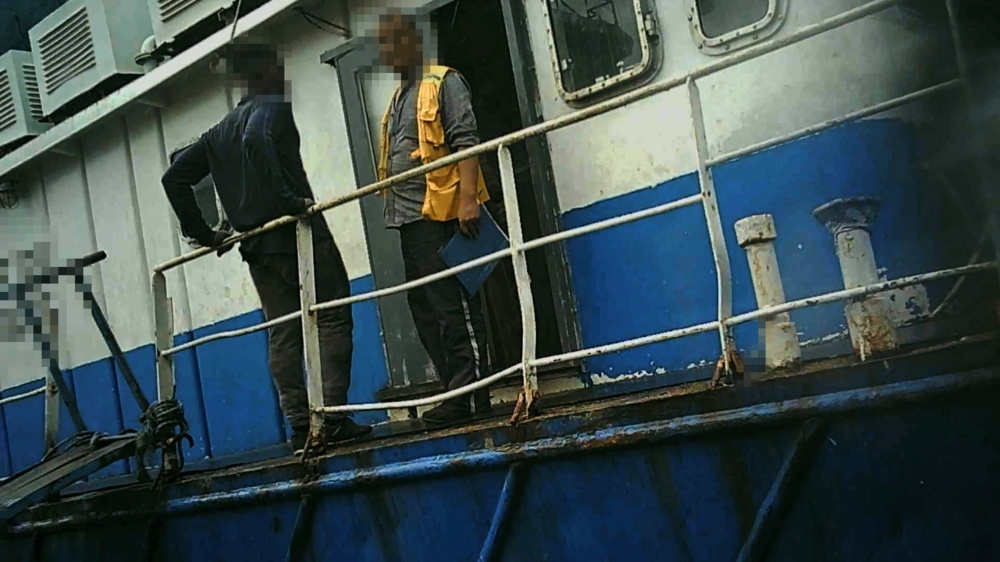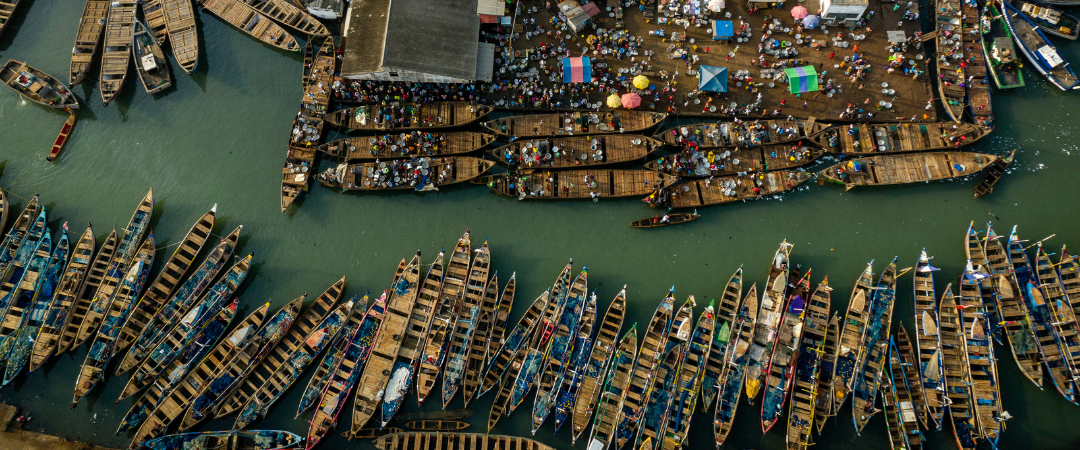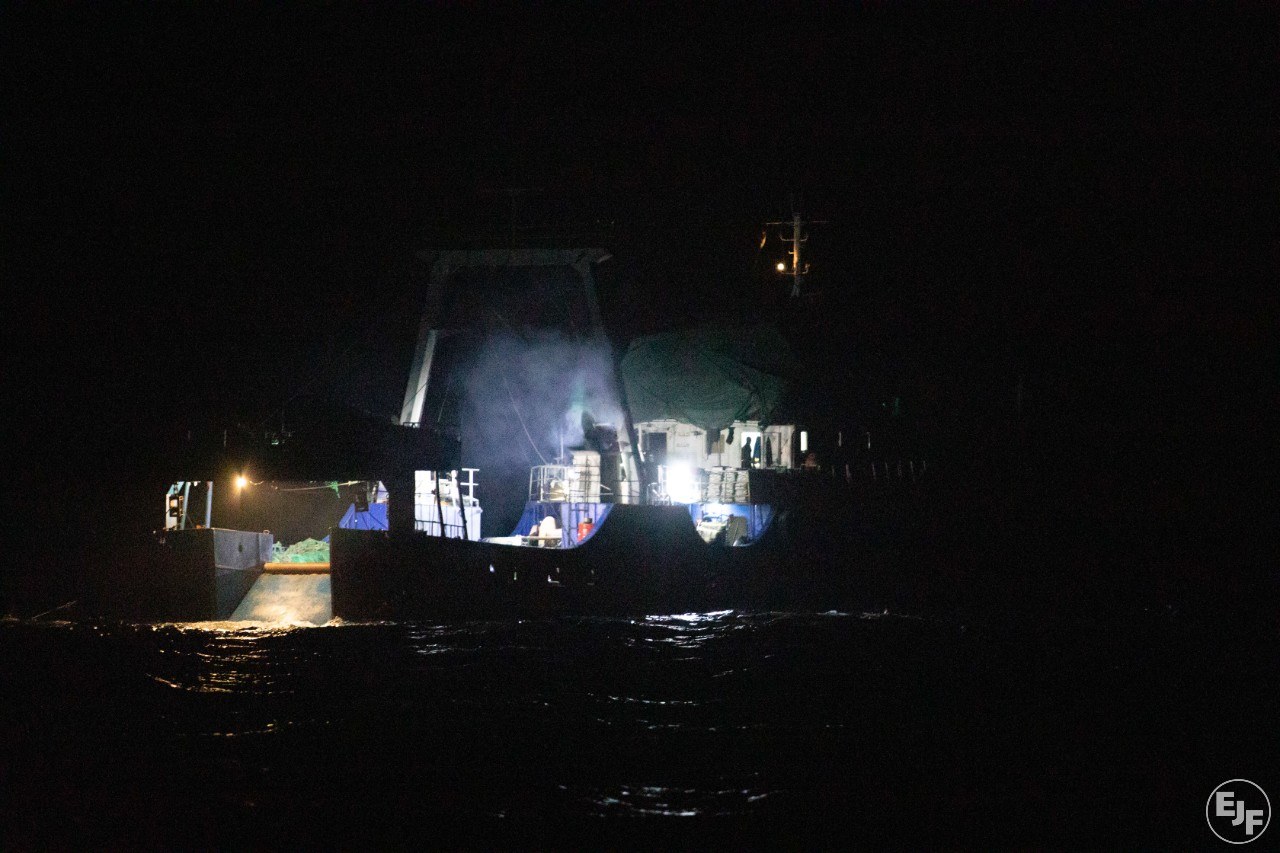
Fisheries observers risk violence on Chinese-owned trawlers fishing in Ghana
Ghanaian fisheries observers are bribed, threatened and abused at sea, investigations by the Environmental Justice Foundation (EJF) have revealed. These conditions have enabled rampant illegal fishing in Ghana’s waters. Action is urgently needed to ensure the safety of these individuals, to curb illegal fishing, and to safeguard coastal livelihoods and the food security of the nation.
Witnesses told EJF that there is a climate of fear for observers who are appointed to monitor and report on illegal fishing in the largely Chinese-owned trawl fleet in Ghana.
One observer said: “The water I drink, the food I eat, even where I sleep, I am always very, very careful.” Another man said: “We fear a lot. Even something like taking a picture and the captain sees you. One time such thing happened to me. I had to tell him that I am not feeling well and asked to join a passing vessel. He became aware and he went further out to sea where I would not be able to make a call.”
Interviewees reported violent incidents such as a captain threatening to hit an observer with a metal bar when he was found trying to preserve evidence of illegal fishing. In another case a captain threatened an observer with a knife when he tried to prevent juvenile fish from being dumped at sea.
Several men referenced the case of Emmanuel Essien, who went missing at sea in July 2019 from the Chinese-owned vessel Meng Xin 15. Fellow observers expressed their disbelief that he had simply fallen overboard and were seriously concerned about foul play.
A particularly destructive form of illegal fishing in Ghana is known as saiko, where industrial trawlers illegally target small pelagic fish, the staple catch of small-scale canoe fishers, and sell this catch back to coastal communities for profit. Despite operating under the Ghanaian flag, an investigation by the EJF revealed that around 90% of Ghana’s industrial fishing fleet is linked to Chinese ownership.
Records show that illegal saiko fish made up around half of the catch on the voyage when Emmanuel went missing. In his report from the penultimate vessel he worked on, which had been allegedly involved in catching under-sized fish and engaging in illegal trans-shipment, Emmanuel had written “I humbly plead with the police to investigate further.”
In June 2021, Ghana became the second country ever to be given a second yellow card – a formal warning over illegal fishing that could lead to a seafood export ban to the EU. Ghana’s laws were substantially improved after its first warning in 2013, however, failure to implement these policies or to prosecute vessels that break them mean illegal fishing remains rife in Ghana.
“We are raising issues [but] there is no difference at all. Up till now absolutely nothing has been done,” said one observer.
Similarly, despite a statement made by the government in November 2019 to end saiko, in-person monitoring at Elmina port by EJF shows that it continues unchecked, with over 1,300 saiko landings since the announcement was made. This equates to around 34,320 tonnes of illegally landed fish. Observers have also confirmed that saiko is still ongoing.
Steve Trent, CEO of the Environmental Justice Foundation, said: “Ghana’s fisheries are at the point of collapse, and the effective monitoring and enforcement of the largely Chinese-owned trawl fleet is desperately needed. Yet the failure of the Ghanaian government to crackdown on the lawlessness and illegal fishing has meant that these fisheries observers are putting themselves in physical danger to report illegal fishing and even then no action is taken. Ghanaian authorities need to act urgently, with determination, ending the threats and bribery and bringing wage structures under government control. They must follow up on the multiple reports of illegal fishing, engaging a fair and transparent process to secure prosecutions, convictions and meaningful deterrent sanctions. Perhaps above all, they need to introduce transparent systems and tools, listed in EJF's Charter for Transparency, to make sure these kinds of abuses cannot happen again.”
Urgent reforms are required to ensure the security of fisheries observers and end illegal practices in the trawl fleet to save Ghana’s small pelagic fishery from imminent collapse.
ENDS
Notes for editors
Watch the film
Read the briefing and report on Human rights in Ghana’s industrial trawl fleet.
Read EJF’s Charter for Transparency in fisheries.
- Over 2.7 million people in Ghana rely on the country’s coastal fisheries for their food and income.
- Saiko catches in 2017 were worth US$ 40.6 - 50.7 million when sold at sea, and US$ 52.7 - 81.1 million when sold at the landing site.
- In 2017 industrial trawlers caught almost the same amount of fish as the entire artisanal sector, when illegal and unreported catches are taken into account. That is 76 trawlers catching approximately the same amount of fish as over 11,000 canoes or 100,000 fishers.
- Ghana’s 2002 Fisheries Act prohibits foreign ownership in the country’s trawl sector. However, Chinese companies use local ‘front’ companies to register as Ghanaian and circumvent the law. Although flagged to Ghana, EJF has estimated that around 90% of the licensed trawl vessels are linked to Chinese beneficial ownership.
- In 2017, scientists predicted the collapse of Ghana’s small pelagic fishery within 3-7 years in the absence of robust management interventions.
The Environmental Justice Foundation is an international non-governmental organisation working to protect the environment and defend human rights. EJF is a charity registered in England and Wales (1088128). www.ejfoundation.org
SIGN UP FOR OUR EMAILS AND STAY UP TO DATE WITH EJF

